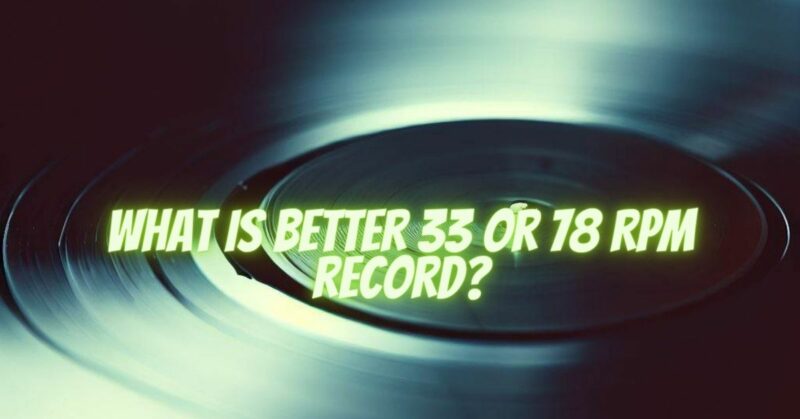When it comes to vinyl records, the speed at which they rotate on the turntable can have a significant impact on the sound quality and overall listening experience. Two common speeds for vinyl records are 33 and 78 revolutions per minute (RPM). In this article, we will delve into the differences between 33 and 78 RPM records and explore which one might be better suited for your listening preferences.
- The Basics: 33 RPM and 78 RPM Explained:
a. 33 RPM: Most commonly associated with LP (Long Play) records, 33 RPM provides a slower rotational speed, allowing for more music to be accommodated on each side of the record. This speed is ideal for albums and extended play formats.
b. 78 RPM: Historically used for early shellac and older vintage records, 78 RPM offers a faster rotational speed. These records typically contain shorter individual songs and were prevalent before the introduction of the microgroove vinyl format.
- Sound Quality Considerations:
a. Frequency Range: 33 RPM records, with their slower speed, generally offer a wider frequency range and more extended bass response. This allows for greater detail and depth in the music reproduction, particularly for albums that prioritize fidelity and dynamic range.
b. Noise and Surface Imperfections: Due to their faster speed, 78 RPM records are generally less forgiving when it comes to surface imperfections and noise. They can accentuate any surface noise, clicks, or pops, making them less suitable for audiophile-grade listening.
- Music Availability:
a. Content Availability: The vast majority of modern vinyl releases, reissues, and new albums are produced at 33 RPM. This means that if you’re primarily interested in contemporary music, 33 RPM records offer a wider selection and greater availability.
b. Vintage and Specialty Music: Vintage and specialty recordings, particularly those from the early 20th century, were often released on 78 RPM records. If you have a specific interest in older music genres, jazz, blues, or historical recordings, 78 RPM records may be more relevant for your collection.
- Turntable Considerations:
a. Turntable Compatibility: Most modern turntables are designed to accommodate 33 and 45 RPM records. While some higher-end models offer switchable speeds to support 78 RPM, it is less common. Therefore, if your turntable lacks 78 RPM capability, it may limit your ability to play and enjoy those records.
- Personal Preference:
Ultimately, the choice between 33 RPM and 78 RPM records depends on your personal preferences, musical interests, and listening goals. Consider the following factors when making your decision:
a. Music Selection: Determine which genres and eras of music you are most interested in exploring. This can help guide your choice between the more prevalent 33 RPM records or the specialized 78 RPM offerings.
b. Sound Fidelity: Assess whether you prioritize sound fidelity, extended frequency range, and enhanced detail (33 RPM), or if you have a penchant for vintage recordings and don’t mind the potential for surface noise (78 RPM).
c. Turntable Capability: Take into account the compatibility of your turntable with 78 RPM records. If you have a specific interest in vintage recordings, ensure that your turntable can accommodate this speed.
Comparison Table
| Feature | 33 RPM | 78 RPM |
|---|---|---|
| Rotation speed | 33 1/3 RPM | 78 RPM |
| Music per side | Up to 20 minutes | Up to 5 minutes |
| Sound quality | Better | Worse |
| Durability | More durable | Less durable |
Conclusion:
The choice between 33 RPM and 78 RPM records ultimately depends on your musical interests, sound preferences, and turntable compatibility. While 33 RPM records offer a wider selection, greater availability, and enhanced sound fidelity, 78 RPM records cater to vintage and specialty recordings, providing a glimpse into music history. Consider your music collection goals, desired sound quality, and turntable capabilities to make an informed decision. Remember, both speeds have their merits, and the joy of vinyl lies in the diversity and richness of the musical journey they offer.


